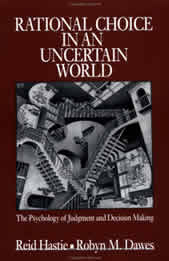« Do crowds make better decisions than individuals? Yes, says author James Surowiecki in The Wisdom of Crowds | Main | Daniel Kahneman »
September 13, 2004
Looking for a good introduction to decsion science?
RATIONAL CHOICE IN AN UNCERTAIN WORLD BY REID HASTIE AND ROBYN M. DAWES
The Psychology of Judgement and Decision Making.
Intended as an introductory textbook for both undergraduate and graduate students, Rational Choice In An Uncertain World lays out the foundations of decision science. In a non-technical style, Hastie and Dawes compare basic principles of rationality with actual behavior in decision-making. This book is not about what to choose, rather about how we choose.
Excerpt:
"Humans evolved from ancestors hundreds of thousands of years ago who lived in small groups and spent most of their waking hours foraging for sustenance. When we weren't searching for something to eat or drink, we were looking for safe places to live, selecting mates, and protecting the offspring from those unions. Our success in accomplishing these "survival tasks" did not arise because of acute senses or especially powerful physical capacities. We dominate this planet today because of our distinctive capacity for good decision making."
"The new knowledge that underlies the filed of decision making is simple principles that define rationality in decision making and empirical facts about the cognitive limits that lead us not to decide rationally."
"One fundamental point of this book is that we often think in automatic ways when making judgments and choices, that these automatic thinking processes can be described by certain psychological rules (e.g., heuristics) and that they can systematically lead us to make poorer judgments and choices that we would by thinking in a more controlled manner abut our decisions. This is not to say that controlled thought is always better than intuitive thought. In fact, we hope the reader who finishes the book will have a heightened appreciation of the relative advantages of the two modes of thinking."
Review by Practical Philosophy: The Journal of the Society for Philosophy in Practice
About the Authors:
PROFESSOR REID HASTIE

Reid Hastie is a Professor of Behavioral Science on the faculty of the Graduate School of Business in the Center for Decision Research at the University of Chicago. His primary research interests are in the areas of judgment and decision making (legal, managerial, medical, engineering, and personal), memory and cognition, and social psychology. He is best known for his research on legal decision making (Social Psychology in Court [with Michael Saks]; Inside the Jury [with Steven Penrod and Nancy Pennington]; and Inside the Juror [edited]) and on social memory and judgment processes (Person Memory: The Cognitive Basis of Social Perception [several co-authors]). Currently he is studying: the role of explanations in category concept representations (including the effects on category classification, deductive, and inductive inferences); civil jury decision making; the role of frequency information in probability judgments; and the psychology of reading statistical graphs and maps.
ROBYN M. DAWES, Ph.D.

Robyn Dawes is the Charles J. Queenan, Jr. University Professor Ph.D.: University of Michigan Department Member Since: 1985 at the Department of Social & Decision Sciences at Carnegie Mellon University. His research interests spans five areas: intuitive expertise, human cooperation, retrospective memory, methodology and United States AIDS policy. He states, "I write journal articles and books because I believe the information they contain could be valuable -- at least on a "perhaps, maybe" basis. I have never written anything with the expectation that it will sell, or become a "citation classic" (although one of my articles has). I believe that in American culture we are obsessed with outcomes rather than with behaving in ways that tend to bring about the best expected outcomes, while "time and chance" play a very important role. [...] Some of my clinical colleagues claim that feelings are not understood until they can be put into words. My own view is that every translation of a feeling, thought, idea or mathematical form into words involves at least a small element of automatic distortion, often a much larger element."
Posted by DSN at September 13, 2004 10:06 PM
